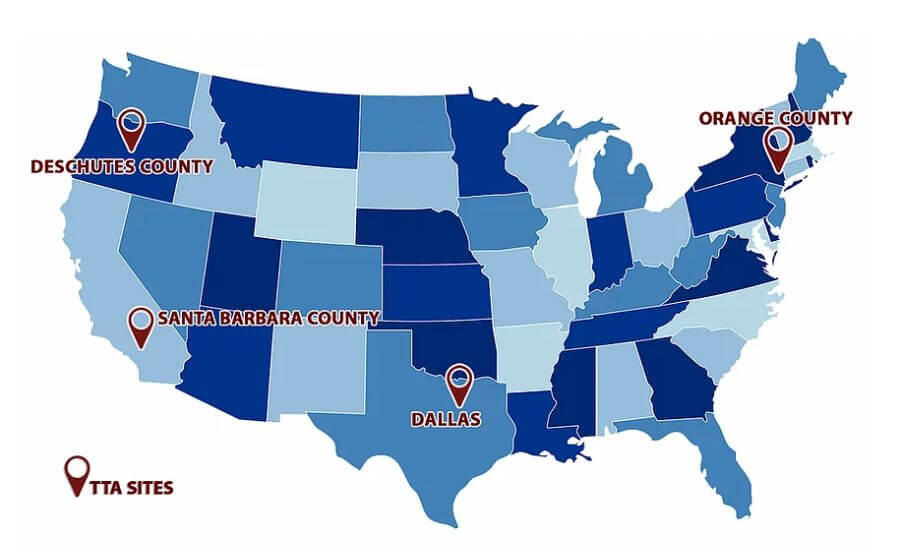Training and Technical Assistance Sites

A joint committee comprised of the Bureau of Justice Assistance (BJA), the Association of Prosecuting Attorneys (APA), and the Center for Court Innovation (CCI), conducted a national email solicitation of prosecutor’s offices to identify those interested in implementing a prosecutor-led diversion program targeting incarceration-bound individuals with drug or alcohol abuse issues, mental illness issues, or those who are victims of human trafficking.
To date, four sites have been designated as Prosecutor-Led Diversion Training & Technical Assistance Sites. BJA, APA, CCI, the Prosecutor-Led Diversion Mentor Site and various Subject Matter Experts (SME’s) have worked with these sites to develop, implement, and evaluate their proposed prosecutor-led diversion programs. Each site has received assistance in developing a project action plan that articulates goals and objectives, action items, a project implementation timeline, and assistance in the implementation and evaluation of the program.
The current sites are:
Deschutes County (OR) District Attorney’s Office – The Deschutes County District Attorney’s Office is currently implementing several diversion programs that involve misdemeanor and felony offenses, participants that are drug-involved, mentally ill, veterans, young adults, and individuals who have engaged in acts of domestic violence.
The office utilized intensive training and technical assistance available under this grant program to further develop their initial drug diversion program that targeted low-risk drug offenders. This program incorporated the use of risk- and needs-based assessment tools to guide program decisions and included comprehensive program evaluation. The impact of this initial diversion program and the knowledge gained through participation in the TTA grant program has led the office to since develop additional diversion initiatives that address specific populations and target other offenses.
Santa Barbara County (CA) District Attorney’s Office – The Santa Barbara District Attorney’s Office maintains over seven diversion programs that are offered to juveniles and young adults, drug-involved individuals, alcohol-involved individuals, and victims of sexual exploitation. The programs involve misdemeanors, marijuana possession and other low-level drug felonies, and low-level property felonies.
The office used the intensive training and technical assistance available under this grant program to develop a pre-filing, prosecutor-led diversion program that focuses on felony property offenses committed by individuals who are drug and alcohol-involved or who are mentally ill. The office also explored the use of risk- and needs-based assessment tools to assist decision making pertaining to participant programming.
Dallas County (TX) District Attorney’s Office – The Dallas County District Attorney’s Office has more than a half a dozen diversion programs operating as problem-solving courts that are offered to drug-involved individuals, alcohol-involved individuals, and juveniles and young adults. These programs involve misdemeanors, marijuana possession and other lower level drug felonies.
The office used the intensive training and technical assistance available under this grant program to fill an existing gap in less intensive, non-specialty court involved, prosecutor-led diversion programing. The office also created a set of diversion options that can funnel participants from the least intensive, non-court involved intervention to the most intensive specialty court seamlessly, depending on a participant’s degree of successful participation.
Orange County (NY) District Attorney’s Office – The Orange County District Attorney’s Office has at least seven diversion programs that involve misdemeanors, low-level drug felonies, and low-level property felonies. These programs are offered to juveniles, young adults, drug-involved individuals, individuals with mental illness, alcohol-involved individuals, and shoplifters.
The office utilized the intensive training and technical assistance available under this grant program to develop an array of prosecutor-led diversion programming that is more coherent and policy-driven than the process that existed previously, which relied on the individual decisions of each prosecutor.
